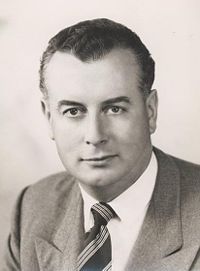Gough Whitlam Prime minister
Edward Gough Whitlam AC QC (/ˈɡɒf ˈwɪtləm/ 11 July 1916 – 21 October 2014) was the 21st Prime Minister of Australia, serving from 1972 to 1975. The Leader of the Labor Party from 1967 to 1977, Whitlam led his party to power for the first time in 23 years at the 1972 election. He went on to win the 1974 election before being controversially dismissed by the Governor-General of Australia, Sir John Kerr, at the climax of the 1975 Australian constitutional crisis. Whitlam remains the only Australian prime minister to have his commission terminated in that manner.Whitlam served in the Royal Australian Air Force during World War II and worked as a barrister following the war. He was first elected to Parliament in 1952, representing Werriwa in the House of Representatives. Whitlam became Deputy Leader of the Labor Party in 1960, and in 1967, after the retirement of Arthur Calwell, was elected Leader and became the Leader of the Opposition. After narrowly losing the 1969 election, Whitlam led Labor to victory at the 1972 election after 23 years of continuous Liberal-Country Coalition Government.The Whitlam Government implemented a large number of new programs and policy changes, including the termination of military conscription, institution of universal health care and free university education, and the implementation of legal aid programs. With the opposition-controlled Senate delaying passage of bills, Whitlam called a double dissolution election in 1974 in which he won a majority in the House of Representatives, albeit a slightly reduced one. However, the opposition continued to control the Senate and, reacting to government scandals and a flagging economy, continued to challenge Whitlam. In late 1975, the Senate delayed the progress of appropriation bills, thus denying the government supply. Whitlam refused to back down, arguing that his government was being held to ransom by the Senate. The crisis ended on 11 November, when the Governor-General, Sir John Kerr, dismissed Whitlam and commissioned the opposition Leader, Malcolm Fraser, as prime minister on the understanding that he would pass the supply bills and advise a general election. Labor lost the subsequent election by a landslide.Whitlam stepped down after losing again at the 1977 election, retiring from parliament in 1978. Upon the election of the Hawke Government in 1983, he was appointed as Ambassador to UNESCO. He remained active into his nineties. The circumstances of his dismissal and the legacy of his government remain a large part of Australian political discourse.
Personal facts

| Birth date | July 11, 1916 |
|---|---|
| Birth name | Edward Gough Whitlam |
| Birth place | |
| Residence | |
| Education | |
| Spouse | |
| Children | |
| Profession |
Search
Politician
| military operations | |
|---|---|
| deputy | |
| governorgeneral | |
| military branch | |
| military rank | |
| military unit | |
| monarch | |
| office | Leader of the Opposition Deputy Leader of the Labor Party Leader of the Labor Party |
| party | |
| service start | 1941 |
| service end | 1945 |
| successor |
Prime minister
| From | March 07, 1960 |
|---|---|
| To | February 09, 1967 |
Topical connections
Gough Whitlam on Wikipedia
External resources
- http://aso.gov.au
- http://aso.gov.au/titles/historical/kerrs-cur
- http://books.google.com/?id=FktbMQAEN-UC&lpg=PA7&dq=whitlam%20timor&pg=PA5#v=onepage&q=whitlam%20timor
- http://primeministers.naa.gov.au/primeministers/whitlam/index.aspx
- http://whitlamdismissal.com
- http://www.abc.net.au/rural/telegraph/speeches/whitlam.htm
- http://www.australianbeers.com/culture/letter.htm
- http://www.penguin.com.au/products/9780670075737/men-and-women-australia-our-greatest-modern-speeches/19289834/gough-whitlam-it-s-time
- http://www.whitlam.org